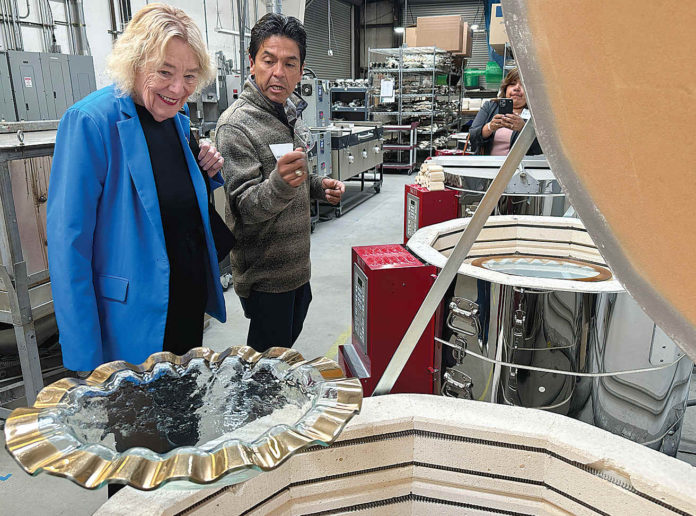
One year ago, Watsonville’s Annieglass installed 249 solar panels on the factory’s roof, a 16,000-square-foot project that has reduced the company’s annual electricity bill by more than 86%.
The $320,000 project came thanks to a grant from the U.S. Department of Energy as part of Biden-Harris Investing in America agenda. This provides funding through the American Rescue Plan, the Bipartisan Infrastructure Law, the CHIPS and Science Act and the Inflation Reduction Act.
Under that legislation, small manufacturers that use large amounts of energy were chosen to convert to eco-friendly systems, with emphasis on businesses owned by women and minorities.
Congresswoman Zoe Lofgren, who attended the one-year celebration for the project, praised that legislation.
“We believe that investing in America and lifting up America was the right thing to do,” she said. “And not only would we do that—lift up small businesses across the United States—but also reduce greenhouse gasses, and attack climate change, which is an existential threat to our children and our grandchildren.”
Owner Annie Morhauser told a crowd assembled in her factory and outlet at 310 Harvest Drive that she has seen significant cost savings.
Last year, she paid $83,000 in electricity costs, which comes largely from operating 30 ovens, with which she creates some 60,000 pieces annually.
That number has since dropped to $11,000.
Morehauser said she had to repeatedly push PG&E to approve her project.
That mission took on increasingly more significance as the 2024 election approached, and the likelihood that Donald Trump—if elected—would impose his anti-environmental agenda.
“I’m thinking, ‘you know, what happens if the worst happens that I can think of, and this grant will go away,’” she said. “We got it through, but it was a little white-knuckle there for a while.”
Cale Garamendi, chief revenue officer at Sandbar Solar & Electric—the company that installed the solar panels—said the project produces 200,000 kilowatt hours per year.
That’s the equivalent of 300,000 pounds of carbon kept out of the environment, Garamendi said, the weight equivalent of an adult blue whale.
“That’s about 25 or 26 homes of annual electricity usage,” he said. “That’s pretty impressive stuff, and we’re proud to be a part of it.”











Thank you Todd for telling our story and thank you Tarmo for the great pictures!
Annie